2017年外研版必修一英语Module4单元教学试卷含答案
2017年外研版必修一英语Module4单元教学试卷含答案1

第一部分:(共两节, 满分30分)◆第一节(共5小题;每小题1.5分,满分7.5分)听下面5段对话。
每段对话后有一个小题,从题中所给的A、B、C三个选项中选出最佳选项,并标在试卷的相应位置。
听完每段对话后,你都有10秒钟的时间来回答有关小题和阅读下一小题。
每段对话仅读一遍。
1. How much is the MP3 player now?A. 10 dollars.B. 20 dollars.C. 40 dollars.2. What are the two speakers talking about?A. A song collection.B. Their childhood.C. Roads in the countryside.3. What language is probably spoken in the movie?A. French.B. Chinese.C. English.4. Where does this conversation probably take place?A. In a railway station.B. In a market.C. At the airport.5. What will Jim do this Sunday?A. Visit his grandparents.B. Go to the zoo.C. Do his homework.◆第二节(共15小题;每小题1.5分,满分22.5分)听下面5段对话或独白。
每段对话或独白后有几个小题,从题中所给的A、B、C三个选项中选出最佳选项,并标在试卷的相应位置。
听每段对话或独白前,你将有时间阅读各个小题,每小题5秒钟;听完后,各小题将给出5秒钟的作答时间。
每段对话或独白读两遍。
听第6段材料,回答第6至8题。
6. When did the woman see the movie?A. This afternoon.B. In April.C. Last week.7. What did the Music & Movie program say about the movie?A. It was wonderful.B. It was boring.C. It was sad.8. What does the woman mean by her last sentence?A. London is also a beautiful city.B. It rains all the time in London, too.C. She has never been to London.听第7段材料,回答第9至11题。
【单元测试】2017-2018学年外研版必修一Module4验收检测试卷(含答案)
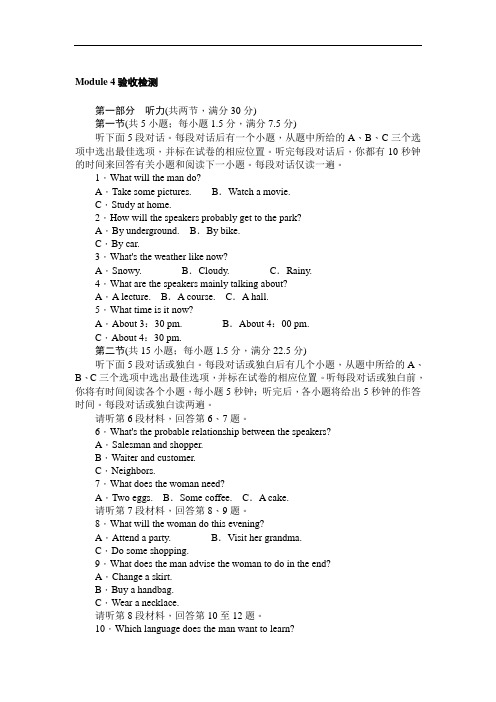
Module 4验收检测第一部分听力(共两节,满分30分)第一节(共5小题;每小题1.5分,满分7.5分)听下面5段对话。
每段对话后有一个小题,从题中所给的A、B、C三个选项中选出最佳选项,并标在试卷的相应位置。
听完每段对话后,你都有10秒钟的时间来回答有关小题和阅读下一小题。
每段对话仅读一遍。
1.What will the man do?A.Take some pictures.B.Watch a movie.C.Study at home.2.How will the speakers probably get to the park?A.By underground. B.By bike.C.By car.3.What's the weather like now?A.Snowy.B.Cloudy.C.Rainy.4.What are the speakers mainly talking about?A.A lecture. B.A course. C.A hall.5.What time is it now?A.About 3:30 pm.B.About 4:00 pm.C.About 4:30 pm.第二节(共15小题;每小题1.5分,满分22.5分)听下面5段对话或独白。
每段对话或独白后有几个小题,从题中所给的A、B、C三个选项中选出最佳选项,并标在试卷的相应位置。
听每段对话或独白前,你将有时间阅读各个小题,每小题5秒钟;听完后,各小题将给出5秒钟的作答时间。
每段对话或独白读两遍。
请听第6段材料,回答第6、7题。
6.What's the probable relationship between the speakers?A.Salesman and shopper.B.Waiter and customer.C.Neighbors.7.What does the woman need?A.Two eggs. B.Some coffee. C.A cake.请听第7段材料,回答第8、9题。
高中英语创新方案外研版必修1:单元卷四 含答案
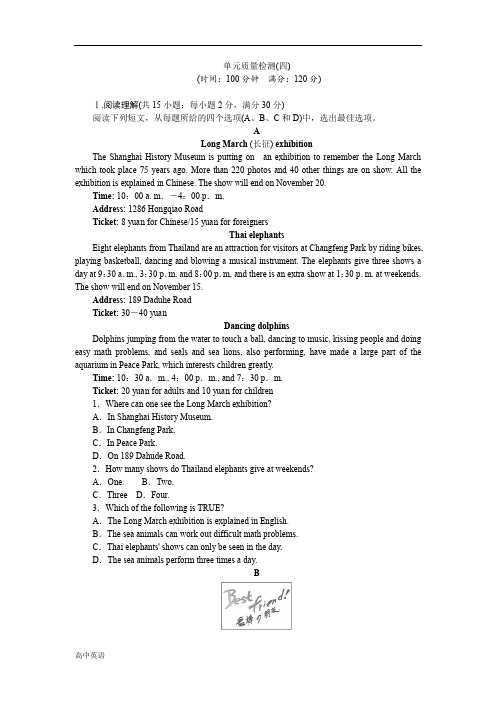
单元质量检测(四)(时间:100分钟满分:120分)Ⅰ.阅读理解(共15小题;每小题2分,满分30分)阅读下列短文,从每题所给的四个选项(A、B、C和D)中,选出最佳选项。
ALong March (长征) exhibitionThe Shanghai History Museum is putting on an exhibition to remember the Long March which took place 75 years ago. More than 220 photos and 40 other things are on show. All the exhibition is explained in Chinese. The show will end on November 20.Time: 10:00 a. m.-4:00 p.m.Address: 1286 Hongqiao RoadTicket: 8 yuan for Chinese/15 yuan for foreignersThai elephantsEight elephants from Thailand are an attraction for visitors at Changfeng Park by riding bikes, playing basketball, dancing and blowing a musical instrument. The elephants give three shows a day at 9:30 a.m., 3:30 p.m. and 8:00 p.m, and there is an extra show at 1:30 p.m. at weekends. The show will end on November 15.Address: 189 Daduhe RoadTicket: 30-40 yuanDancing dolphinsDolphins jumping from the water to touch a ball, dancing to music, kissing people and doing easy math problems, and seals and sea lions, also performing, have made a large part of the aquarium in Peace Park, which interests children greatly.Time: 10:30 a.m., 4:00 p.m., and 7:30 p.m.Ticket: 20 yuan for adults and 10 yuan for children1.Where can one see the Long March exhibition?A.In Shanghai History Museum.B.In Changfeng Park.C.In Peace Park.D.On 189 Dahude Road.2.How many shows do Thailand elephants give at weekends?A.One.B.Two.C.Three D.Four.3.Which of the following is TRUE?A.The Long March exhibition is explained in English.B.The sea animals can work out difficult math problems.C.Thai elephants' shows can only be seen in the day.D.The sea animals perform three times a day.BToo many people want others to be their friends, but they don't give friendship back. That is why some friendships don't last very long. To have a friend, you must learn to treat your friend the way you want your friend to treat you. Learning to be a good friend means learning three rules: be honest; be generous (宽宏大量的); be understanding.Honesty is where a good friendship starts. Friends must be able to trust one another. If you do not tell the truth, people usually find out. If a friend finds out that you haven't been honest, you may lose your friend's trust. Good friends always rely on one another to speak and act honestly.Generosity means sharing and sharing makes a friendship grow. You do not have to give your lunch money or your clothes. Naturally you will want to share your ideas and feelings. These can be very valuable to a friend. They tell your friend what is important to you. By sharing them, you help your friend know better.Sooner or later everyone needs understanding and help with a problem. Something may go wrong at school. Talking about the problem can make it easier to solve. Turning to a friend can be a first step in solving the problem. So to be a friend you must listen and understand. You must try to put yourself in your friend's place so that you can understand the problem better.No two friendships are exactly alike (相同的). But all true friendships have three things in common. If you plan to keep your friends, you must practice honesty, generosity and understanding.4.Some friendships don't last long because ________.A.there are too many people who want to make friendsB.those who give others friendship receive friendship from othersC.some people receive friendship but don't give friendship backD.they don't know friendship is something serious5.According to the passage, honesty is ________.A.something countableB.the base of friendshipC.as important as moneyD.more important than anything else6.In the third paragraph, the underlined word “they”refers to (指) ________.A.generosity and friendshipB.generosity and sharingC.your ideas and feelingsD.your clothes7.The best title of this passage is ________.A.How to Be a FriendB.Honesty Is the Best PolicyC.A Friend in Need Is a Friend IndeedD.Three Important Points in LifeCIn 1999, twelve percent of public elementary schools in the United States required students to wear uniforms. Just three years later, the amount was almost double that.A study of six big-city Ohio public schools showed students who were required to wear uniforms had improved graduation, behavior and attendance rates. Academic performance was unchanged.Some high schools in Texas have also joined in the movement. Yet studies find mixed results from requiring uniforms. And some schools have turned away from such policies.Supporters believe dressing the same creates a better learning environment and safer schools. The school district in Long Beach, California, was the first in the country to require uniforms in all elementary and middle schools. The example helped build national interest in uniforms as a way to deal with school violence and improve learning.Findings in Long Beach suggested that the policy resulted in fewer behavior problems and better attendance. But researcher Viktoria, who has looked at those findings, says they were based only on opinions about the effects of uniforms.She says other steps taken at the same time to improve schools in Long Beach and statewide could have influenced the findings. The district (the area marked by government) increased punishments for misbehavior. And California passed a law to reduce class sizes.In Florida, for example, researcher Sharon found that uniforms seemed to improve behavior and reduce violence. In Texas, Eloise found fewer discipline problems among students required to wear uniforms, but no effect on attendance.Sociologist David has studied school uniform policies since 1988. He collected the reports in the book. In his own study, he found that reading and mathematics performance dropped after a school in Pennsylvania (宾夕法尼亚州) required uniforms.Political and community pressures may persuade schools to go to uniforms to improve learning. But David and others believe there is not enough evidence of a direct relationship. In fact, he says requiring uniforms may even increase discipline problems.8.Which of the following researchers are NOT supporters of school uniform policies?A.Viktoria and Sharon.B.Sharon and David.C.Eloise and Sharon.D.Viktoria and David.9.The underlined word “misbehavior”in the sixth paragraph probably means “________”.A.serious crimeB.bad performanceC.absence for classD.action against wearing uniforms10.What can we infer from the passage?A.More work is needed to get better information about uniform's effect.B.The number of schools requiring uniforms in the U.S. will become less sharply.C.Wearing uniforms has little to do with behavior and learning.D.Politicians and communities won't vote for uniform policies.11.What's the main idea of this passage?A.More and more students are required to wear uniforms in the U.S.B.Wearing uniforms contributes to good academic performance.C.Researchers in the U.S. argue for school uniform policies.D.Evidence for school uniform polices in the U.S. is seen as weak.DUntil late in the 20th century most Americans spent time with people of different generations. Now middle-aged Americans may not keep in touch with old people until they are old themselves.That's because we group people by age. We put our threeyearolds together in daycare centers, our 13-year-olds in schools and sport activities, and our 80-year-olds in senior citizen homes. Why?We live far away from the old for many reasons. Young people sometimes avoid the old to get rid of fears of becoming old and dying. It is much harder to watch someone we love disappear before our eyes. Sometimes it's got hard that we stay away from the people who need us the most.Fortunately, some of us have found our way to the old. And we have discovered that they often save the young.A reporter moved her family into a block filled with old people. At first her children were disappointed. But the reporter made banana bread for the neighbors and had her children send it and visit them. Soon the children had many new friends, with whom they shared food, stories and projects. “My children have never been lonely,”the reporter said.The young, in turn, save the old. Once I was in a rest home (an organization where old people are cared for) when a visitor showed up with a baby, she was immediately surrounded. People who hadn't gotten out of bed in a week suddenly were ringing for a wheelchair. Even those who had seemed asleep woke up to watch the child. Babies have an astonishing power to comfort and cure.Grandparents are a special case. They give their grandchildren a feeling of security and continuity. As my husband put it “My grandparents gave me a deep sense that things would turn out right in the end.” Grandchildren speak of attention th ey don't get from worried parents. “My parents were always telling me to hurry up, and my grandparents told me to slow down,”one friend said. A teacher told me she can tell which pupils have relationships with grandparents: they are quieter, calmer and more trusting.12.Now in an American family, people can find that ________.A.children never live with their parentsB.not all working people live with their parentsC.old people are supported by their grandchildrenD.grandchildren are supported by their grandparents13.Seeing a baby, the old people got excited because ________.A.they had never seen a baby beforeB.the baby was clever and beautifulC.the baby brought them the image of lifeD.the baby's mother would take care of them14.Why are some children quieter, calmer and more trusting?A.Because they have relationships with their grandparents.B.Because their worried parents ask them to act like that.C.Because they have nothing to worry about.D.Because their teachers ask them to act like that.15.Which of the following can show the fact that the old often save the young?A.The old can become friends of the children and the children may not feel lonely.B.The old get excited when they see a baby.C.The old can cure the young when they are sick.D.Babies have an astonishing power to comfort and cure.Ⅱ.任务型阅读(共5小题;每小题2分,满分10分)根据短文内容,从短文后的选项中选出能填入空白处的最佳选项。
外研版高中英语必修第一册Unit4单元测试试卷含答案-答案在前

Unit 4 Friends forever 单元测试答案解析第一部分听力材料(Text 1)W: Are you staying at your aunt’s or a hotel after you get to Beijing?M: Neither. I’ll stay at a friend’s.(Text 2)W: What about going to the cinema this weekend, Henry?M: I’d planned to stay at home and read a book, but David asked me to go to the countryside with him.(Text 3)W: Hey Jack! Do you want to see a picture of my new young dog?M: Sure! I thought people only showed off pictures of their new babies, not new pets.(Text 4)M: What are you reading, Sam?W: Sara’s travel journal. She said it might help me learn more about some of the cities around the world.M: Can I read it when you’re done? You know, I like writing stories. I wonder if reading her journal will help me write better.(Text 5)W: When are you leaving for England, Mike?M: I’d planned to leave this Friday, but I’ve changed my plan.W: So are you leaving later, on the weekend?M: No, I’m leaving a day earlier than planned.听第6 段材料,回答第6、7 题。
2017-2018学年高中外研版英语必修一教学案:Module+4+Section+Ⅳ+Other+Parts+of+the+Module+Word版含答案
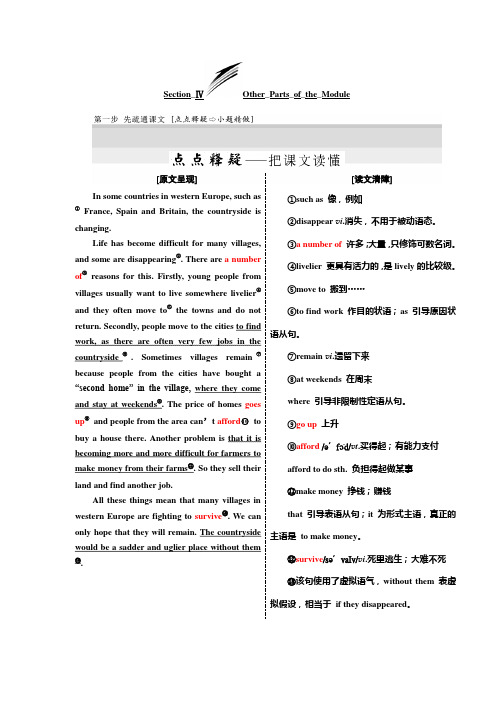
Section_ⅣOther_Parts_of_the_Module[原文呈现]In some countries in western Europe, such as ①France, Spain and Britain, the countryside is changing.Life has become difficult for many villages, and some are disappearing②. There are a number of③reasons for this. Firstly, young people from villages usually want to live somewhere livelier④and they often move to⑤the towns and do not return. Secondly, people move to the cities to find work, as there are often very few jobs in the countryside⑥. Sometimes villages remain⑦because people from the cities have bought a “second home” in the village, where they come and stay at weekends⑧. The price of homes goes up⑨and people from the area can’t afford○10to buy a house there. Another problem is that it is becoming more and more difficult for farmers to make money from their farms⑪. So they sell their land and find another job.All these things mean that many villages in western Europe are fighting to survive⑫. We can only hope that they will remain. The countryside would be a sadder and uglier place without them ⑬.[读文清障]①such as 像,例如②disappear v i.消失,不用于被动语态。
外研版英语高一必修一module4_单选题
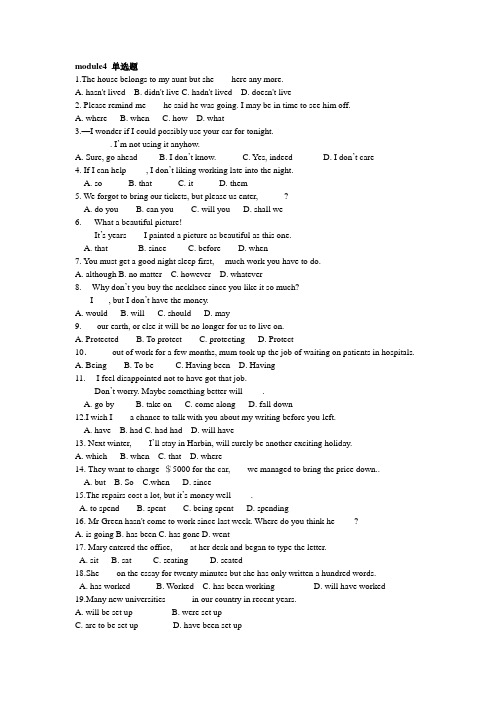
module4 单选题1.The house belongs to my aunt but she ___ here any more.A. hasn't livedB. didn't liveC. hadn't livedD. doesn't live2. Please remind me ___ he said he was going. I may be in time to see him off.A. whereB. whenC. howD. what3.—I wonder if I could possibly use your car for tonight.---_____. I’m not using it anyhow.A. Sure, go aheadB. I don’t know.C. Yes, indeedD. I don’t care4. If I can help ____, I don’t liking working late into the night.A. soB. thatC. itD. them5. We forgot to bring our tickets, but please us enter,______?A. do youB. can youC. will youD. shall we6. --- What a beautiful picture!--- It’s years ___ I painted a picture as beautiful as this one.A. thatB. sinceC. beforeD. when7. You must get a good night sleep first,__ much work you have to do.A. althoughB. no matterC. howeverD. whatever8.--- Why don’t you buy the necklace since you like it so much?--- I ___, but I don’t have the money.A. wouldB. willC. shouldD. may9.___ our earth, or else it will be no longer for us to live on.A. ProtectedB. To protectC. protectingD. Protect10.___ out of work for a few months, mum took up the job of waiting on patients in hospitals.A. BeingB. To beC. Having beenD. Having11.--- I feel disappointed not to have got that job.--- Don’t worry. Maybe something better will ____.A. go byB. take onC. come alongD. fall down12.I wish I ___ a chance to talk with you about my writing before you left.A. haveB. hadC. had hadD. will have13. Next winter, ___ I’ll stay in Harbin, will surely be another exciting holiday.A. whichB. whenC. thatD. where14. They want to charge $5000 for the car, ___ we managed to bring the price down..A. butB. SoC.whenD. since15.The repairs cost a lot, but it’s money well ____.A. to spendB. spentC. being spentD. spending16.Mr Green hasn't come to work since last week. Where do you think he ____?A. is goingB. has beenC. has goneD. went17. Mary entered the office, ___ at her desk and began to type the letter.A. sitB. satC. seatingD. seated18.She ___ on the essay for twenty minutes but she has only written a hundred words.A. has workedB. WorkedC. has been workingD. will have worked19.Many new universities _____ in our country in recent years.A. will be set upB. were set upC. are to be set upD. have been set up20.It’s not certain how the fire started last night, but it __ by electrical fault.21.A. might start B. might have been started C. may be started D. must have been started21. I haven’t received the letter. It ___ to the wrong address.A. has sentB. must be sentC. is sent D must have been sent22. By the time you get to the airport, she ___ for New Zealand .A. would be leavingB. has already leftC. is leaving D will have left23.—Look!, How long ___ like this?---Three weeks! It’s usual here that rain ___ without stopping these days of the year.A. has it rained; pours B has it been raining; poursC. is it raining, is pouringD. does it rain; pours24. You needn't hurry her; she ___ it by the time you’re readyA will have finished B. will finish C. will be finishing D. has finished25. --- Isn't it hard to drive downtown to work?--- Yes, that’s why I ___ to work by train.A have been going B. have gone C. was going D. will have gone26. --- ____ my dictionary?---Yes. I put it on your desk just now.A. Do you see B Have you seen C. Did you see D. had you seen .27. ---When did he go to America?--- Oh, he ____ there since half a year ago.A. went B has been C. has gone D. was28.The little girl looks ____ when she smiles.A.much prettyB.more prettierC.more pretty D much prettier29.The cities’ bright lights, theaters, films, etc. are____.A.great attraction B great attractions C.attracting D.very attracted30.They have ___ signs in some places to remind(提醒) the visitors not to step on the grass.A.put on B put up C.put down D.put out31.____, people are beginning to realize how serious the situation is.A.Fortunate B Fortunately C.Being fortunate D.Being fortunately32.This is the third time I ___ Hong Kong. The second time I ___ here was on Christmas Day last year.A have visited;came B.have visited; have come C.visite; came D.visited; had come33.The dog was approaching ___ the garden when she ran out.A. toB. towardsC. for D /34.___ students are required to take part in the boat race.A Ten strong young Chinese B. Ten Chinese strong youngC. Chinese ten young strongD. Young strong ten Chinese35.___ of the teachers in our school is about one hundred, and ___ of them are men teachers.A.The number; the small numberB.A number; a small numberC .The number;a small number D.A number; the small number36.—Shall I lock the lab before I go home?-- ___. I’ll check it myself later.A.Go aheadB.No problemC.No hurry D Don’t bother37.Why do we have to ___ Joan’s selfish behavior? She should learn to care for others.A.keep up withB.catch up withC.put up withe up with38.It is almost five years ___ we saw each other last time.A. whenB. since C after D. before39.Many students signed up for the ___ race in the sports meeting to be held next week.A.800-meter-longB.800-meters-longC.800 meter longD.800 meters length40.—I went to the beach and got plenty of rest.--___ You looked tired last time I saw you.A I had hoped so. B. really? C. I’m glad you did. D. That sounds a good idea.。
外研版高一英语必修1Module4练习试题及答案

外研版高一英语必修1Module 4练习试题及答案特别是在英语考试来临前,作为英语教师应该如何准备好自己的课堂教学的复习工作呢?让我们来为学生们制订一份良好的考试卷吧!以下是由店铺收集整理的外研版高一英语必修1Module 4练习试题,欢迎阅读!外研版高一英语必修1Module 4练习试题Ⅰ.用所给词的适当形式填空1.Mr. White ______ just ________ (buy) a recorder for his son.2.She ______ (be) here just now.3.My mother isn’t in.She ________ (go) to the theatre.4.________ you ________ (see) Mr.Smith recently?5.My mother ________ (wake) me up when she ________ (hear)a knock at the door last night.6.Great changes __________ (take) place in China since 1978.7.I hear that the famous singer ________ (be) to America several times.8.I __________ (receive) his letter three days ago.9.He will come as soon as he __________ (finish) the homework.10.If you ____________ (read) the magazine before I leave,please lend it to me.Ⅱ.完成句子1.那本书他已借了一个星期了。
He ______________ the book for a week.2.玛丽到图书馆去了。
高三英语Module 4教案及习题外研版必修一

Module 4 A Social Survey – My Neighbourhood课标要求概览:重点单词: survey n.调查 neighborhood n . 邻居;街坊 local adj .地方的;局部的 suburb n .郊区 hometown n .家乡 pretty adv .很;相当 sound vi .听起来 tourist n .旅游者;观光者 bother vt .打扰;麻烦 nuisance n .令人讨厌的人或事 rent n .租金 district n .地区;区域 approach vt . 接近;方法 harbor n .海港 gorgeous adj .美丽的;宜人的 architecture n .建筑 starve vi .饿死 park vt . 停车 traffic n . 交通 mittee n .委员会 organization n .组织 household n .家属;家人 occupation n .职业 professional adj .专业的 manual adj .用手的;手的 gallery n .美术馆;画廊 exchange vt .交换 fascinating adj .迷人的;吸引人的 afford vt . survive v i.死里逃生;幸存 contact vt .词汇拓展: 1. fortunate(adj)幸运的→fortunately(adv .)→unfortunate 〕→fortune (n .) 2. unemployed(adj)失业的→unemploy (v .)→unemployment(n .)失业 3. tourist →tour(n .)旅游,观光→tourism(n .)旅游业 4.attractive(adj)吸引人的→attraction(n .)吸引力(u.);吸引人的事物(c.)→attract(v .) 5. starve(v .)→starvation(n .)饥饿 重点短语: 1. apartment block 公寓大楼2. be similar to 与……相似 3. on the coast 在海岸边4. by the seaside 在海滨 5. would like/love/prefer to do 愿意做某事 7. as a result 因此,结果 6. so far/ up to now/ till now 直到现在 8. such as 诸如…,例如 9. go up 上升,上涨 10. more and more 越来越…… 11. make money 挣钱 12. put up 建造,X 贴 13. get away from 摆脱 要点归纳: 1. “Her parents are farmers and have recently built a house on their land as their new house.〞 ◢as 用法小结: 1)引导状语从句: (1)“当……时候〞,引导时间状语从句 eg. As she sang, the tears ran down her cheeks. (2)“因为,由于〞,引导原因状语从句 eg. As Jim liked walking, we started off on foot. (3)“如,像〞,引导方式状语从句或比较状语从句。
外研版高一英语必修1_Module4_单元测试
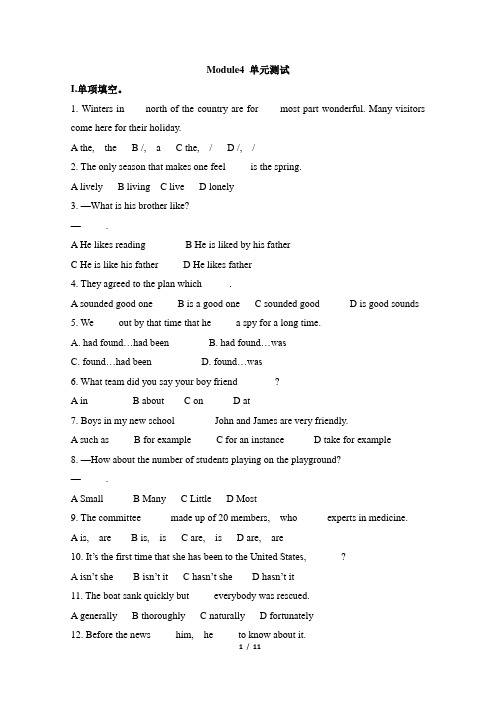
Module4 单元测试I.单项填空。
1. Winters in ___ north of the country are for ___ most part wonderful. Many visitors come here for their holiday.A the, theB /, aC the, /D /, /2. The only season that makes one feel ____ is the spring.A livelyB livingC liveD lonely3. —What is his brother like?—_____.A He likes readingB He is liked by his fatherC He is like his fatherD He likes father4. They agreed to the plan which _____.A sounded good oneB is a good oneC sounded goodD is good sounds5. We ____ out by that time that he ____ a spy for a long time.A. had found…had beenB. had found…wasC. found…had beenD. found…was6. What team did you say your boy friend _______?A inB aboutC onD at7. Boys in my new school _______ John and James are very friendly.A such asB for exampleC for an instanceD take for example8. —How about the number of students playing on the playground?—_____.A SmallB ManyC LittleD Most9. The committee _____ made up of 20 members, who _____ experts in medicine.A is, areB is, isC are, isD are, are10. It’s the first time that she has been to the United States, _____?A isn’t sheB isn’t itC hasn’t sheD hasn’t it11. The boat sank quickly but ____ everybody was rescued.A generallyB thoroughlyC naturallyD fortunately12. Before the news ____ him, he ____ to know about it.A. reaches…has gotB. reached…had gotC. reached…gotD. had reached…got13. You needn’t ______ my breakfast; I’ll eat out.A worry aboutB care forC bother aboutD trouble for14. To record the animal’s natural life, we had to ____ it quietly and watched it carefully.A ignoreB trainC huntD approach15. —Did you go to see the play last night?—Unluckily, I couldn’t ____ it. But I am going to see it soon.A doB manageC makeD takeII.完形填空。
2017年外研版必修一英语Module4单元教学试卷含答案
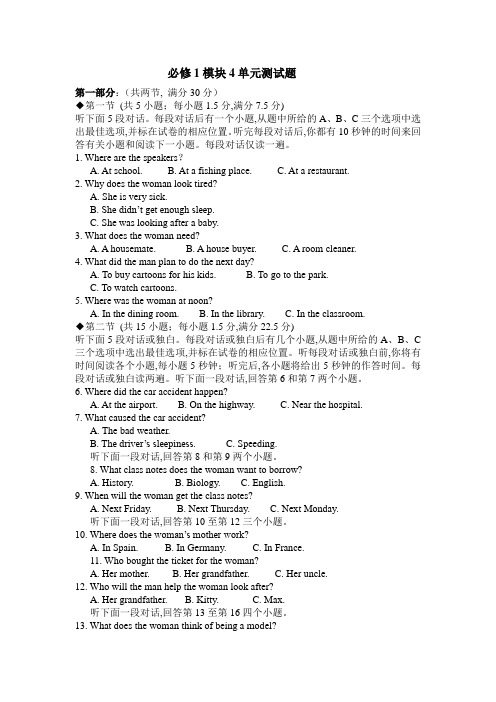
必修1模块4单元测试题第一部分:(共两节, 满分30分)◆第一节(共5小题;每小题1.5分,满分7.5分)听下面5段对话。
每段对话后有一个小题,从题中所给的A、B、C三个选项中选出最佳选项,并标在试卷的相应位置。
听完每段对话后,你都有10秒钟的时间来回答有关小题和阅读下一小题。
每段对话仅读一遍。
1. Where are the speakers?A. At school.B. At a fishing place.C. At a restaurant.2. Why does the woman look tired?A. She is very sick.B. She didn’t get enough sleep.C. She was looking after a baby.3. What does the woman need?A. A housemate.B. A house buyer.C. A room cleaner.4. What did the man plan to do the next day?A. To buy cartoons for his kids.B. To go to the park.C. To watch cartoons.5. Where was the woman at noon?A. In the dining room.B. In the library.C. In the classroom.◆第二节(共15小题;每小题1.5分,满分22.5分)听下面5段对话或独白。
每段对话或独白后有几个小题,从题中所给的A、B、C 三个选项中选出最佳选项,并标在试卷的相应位置。
听每段对话或独白前,你将有时间阅读各个小题,每小题5秒钟;听完后,各小题将给出5秒钟的作答时间。
每段对话或独白读两遍。
听下面一段对话,回答第6和第7两个小题。
6. Where did the car accident happen?A. At the airport.B. On the highway.C. Near the hospital.7. What caused the car accident?A. The bad weather.B. The driver’s sleepiness.C. Speeding.听下面一段对话,回答第8和第9两个小题。
2017-2018学年外研版英语必修一Module 4验收检测 含答
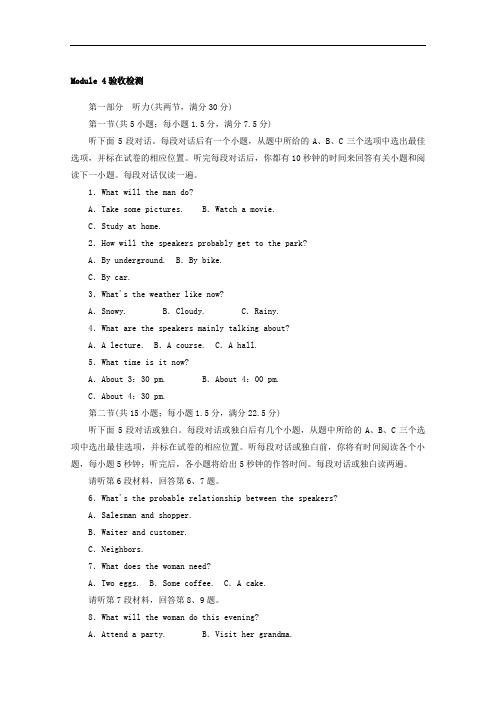
Module 4验收检测第一部分听力(共两节,满分30分)第一节(共5小题;每小题1.5分,满分7.5分)听下面5段对话。
每段对话后有一个小题,从题中所给的A、B、C三个选项中选出最佳选项,并标在试卷的相应位置。
听完每段对话后,你都有10秒钟的时间来回答有关小题和阅读下一小题。
每段对话仅读一遍。
1.What will the man do?A.Take some pictures. B.Watch a movie.C.Study at home.2.How will the speakers probably get to the park?A.By underground. B.By bike.C.By car.3.What's the weather like now?A.Snowy. B.Cloudy. C.Rainy.4.What are the speakers mainly talking about?A.A lecture. B.A course. C.A hall.5.What time is it now?A.About 3:30 pm. B.About 4:00 pm.C.About 4:30 pm.第二节(共15小题;每小题1.5分,满分22.5分)听下面5段对话或独白。
每段对话或独白后有几个小题,从题中所给的A、B、C三个选项中选出最佳选项,并标在试卷的相应位置。
听每段对话或独白前,你将有时间阅读各个小题,每小题5秒钟;听完后,各小题将给出5秒钟的作答时间。
每段对话或独白读两遍。
请听第6段材料,回答第6、7题。
6.What's the probable relationship between the speakers?A.Salesman and shopper.B.Waiter and customer.C.Neighbors.7.What does the woman need?A.Two eggs. B.Some coffee. C.A cake.请听第7段材料,回答第8、9题。
最新高一英语精品学案:Module4 整单元 (外研版必修1)(有答案)
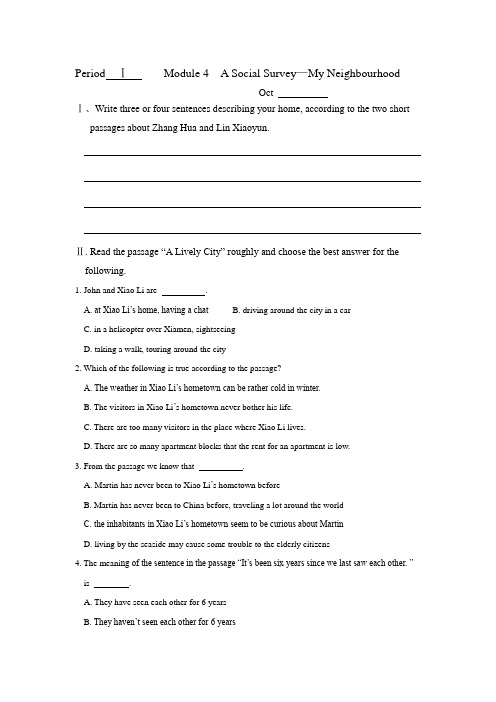
Period ⅠModule 4 A Social Survey—My NeighbourhoodOctⅠ、Write three or four sentences describing your home, according to the two short passages about Zhang Hua and Lin Xiaoyun.Ⅱ. Read the passage “A Lively City” roughly and choose the best answer for the following.1. John and Xiao Li are .A. at Xiao Li’s home, having a chatB. driving around the city in a carC. in a helicopter over Xiamen, sightseeingD. taking a walk, touring around the city2. Which of the following is true according to the passage?A. The weather in Xiao Li’s hometown can be rather cold in winter.B. The visitors in Xiao Li’s hometown never bother his life.C. There are too many visitors in the place where Xiao Li lives.D. There are so many apartment blocks that the rent for an apartment is low.3. From the passage we know that .A. Martin has never been to Xiao Li’s hometown beforeB. Martin has never been to China before, traveling a lot around the worldC. the inhabitants in Xiao Li’s hometown seem to be curious about MartinD. living by the seaside may cause some trouble to the elderly citizens4. The meani ng of the sentence in the passage “It’s been six years since we last saw each other. ”is .A. They have seen each other for 6 yearsB. They haven’t seen each other for 6 yearsC. They knew each other 6 years beforeD. They didn’t know each other 6 years before5. In the sentence “Pretty hot and wet in the summer”, what does the word “pretty” mean?A. a littleB. fairlyC. veryD. beautifully6. What does the sentence “I’m starving” mean?A. I am very thirsty.B. I am very tired.C. I am dying.D. I am very hungry.7. Which is wrong according to the passage?A. John and Xiao Li haven’t seen each other for 6 years.B. There are very few tourists in the northwest of Xiamen.C. There are some interesting buildings on Gulangyu Island.D. Xiao Li enjoys living on the coast.8. The author mainly tells us .A. Gulangyu IslandB. the shopping malls in XiamenC. their tour round the cityD. the weather in XiamenⅢ. Careful reading and preview the language points反思:参考答案:I.略II.1-8 B A A B C D B CPeriod ⅤModule 4 A Social Survey—My NeighbourhoodOct. Ⅰ. Read the passage and answer the following questions.1. What is the best title of the passage? (within 10 words)2. Which sentence can replace the following sentence in the passage?In the village, the price of homes is so high that people can’t buy a house.3. Why do so many young people move to cities? (within 20 words)4. Are you for or against the young people’s moving to cities to make a life? Why ? (within 30 words)5. Translate the following sentence into Chinese.Sometimes villages remain because people from the cities have bought a “second home” in the village, where they come and stay at weekends.Ⅱ. Language points:such as ——用以列举事例(两个以上),前之范围的一部分1.for example (e. g)——例如(多为一个例子),多用作插入语e. g. ①Wood can be made into many things such as desks, chairs and beds.②A robot is very useful , for example, it can be used in an operation.【拓展】for example =for instancetake…for example 以…为例set an example to sb. 给某人树立榜样follow the example of sb. 以某人为学习榜样Ex. 我们要以雷锋为榜样,热心去帮助他人。
外研版英语必修1 Module 4 模块测试题
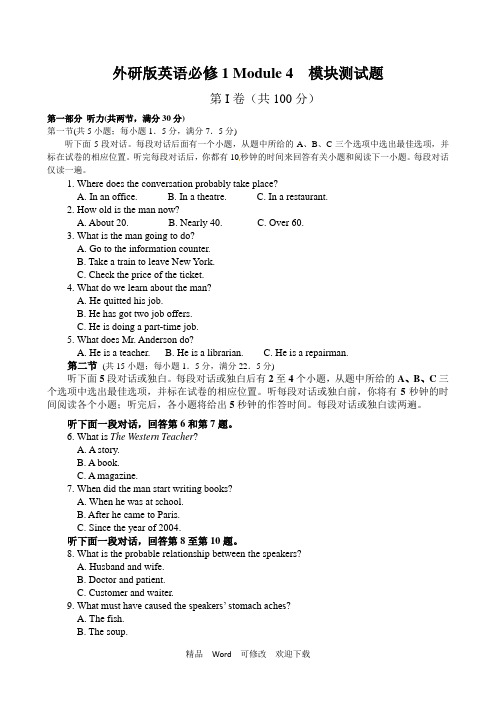
外研版英语必修1 Module 4 模块测试题第I卷(共100分)第一部分听力(共两节,满分30分)第一节(共5小题;每小题1.5分,满分7.5分)听下面5段对话。
每段对话后面有一个小题,从题中所给的A、B、C三个选项中选出最佳选项,并标在试卷的相应位置。
听完每段对话后,你都有10秒钟的时间来回答有关小题和阅读下一小题。
每段对话仅读一遍。
1. Where does the conversation probably take place?A. In an office.B. In a theatre.C. In a restaurant.2. How old is the man now?A. About 20.B. Nearly 40.C. Over 60.3. What is the man going to do?A. Go to the information counter.B. Take a train to leave New York.C. Check the price of the ticket.4. What do we learn about the man?A. He quitted his job.B. He has got two job offers.C. He is doing a part-time job.5. What does Mr. Anderson do?A. He is a teacher.B. He is a librarian.C. He is a repairman.第二节(共15小题;每小题1.5分,满分22.5分)听下面5段对话或独白。
每段对话或独白后有2至4个小题,从题中所给的A、B、C三个选项中选出最佳选项,并标在试卷的相应位置。
听每段对话或独白前,你将有5秒钟的时间阅读各个小题;听完后,各小题将给出5秒钟的作答时间。
每段对话或独白读两遍。
module4单元检测附答案(外研版必修1)

阶段性测试题姓名___________________一. 单词拼写(每题1分,共15分)1. Your car is out of date;_________________(交换) it for a new one.2. According to the __________________(调查),most boys like to play computer games.3. I am sorry to _________________(打扰) you. Could you help me with work?4. Yao Ming is a __________________(职业的) basketball player.5. For further information, please ________________(联络)our local office.6. This MP3 is really dear. I can not ___________________(买得起) to buy it.7. He _________________(幸存) in the flood, but unluckily his wife was killed.8. He is very _________________(幸运) because his boss is satisfied with his work.9. Everyone can get on well with him, because he is easy to ____________________. (接近)10. The seaside is very ____________________(有吸引力的) for me.11. He lives in the ___________________(郊区) and goes to work and comes back home on the subway.12. Let’s stop here and get something to eat. I am ________________. (饿得要死)13. Last summer, my parents took me to the national art _________________(画廊)14. It is _______________(很)funny to play with your pet dog.15. Please state your name , age and ___________________(职业)(1. exchanging, 2. survey 3.disturb 4.professional 5. contact 6. afford 7. survived 8. fortunate9. approach10. attractive 11. surburb 12. starving 13. gallery 14. pretty 15. occupation )二. 写出下列词组(每题2分,共30分)1 在沿海____________________________2 修建/建立__________________________3 一会儿____________________________4 到处走走___________________________5 到目前为止________________________6 交换意见___________________________7 摆脱______________________________ 8 许多_______________________________9 上升______________________________ 10 赚钱______________________________11 例如_____________________________ 12 在周末____________________________13 商业区___________________________ 14 做某事感到很幸运__________________15去吃午饭_________________________(1.by the seaside, 2. put up 3.for a while 4.walk about 5. so far 6. exchange ideas 7.get away from 8. a great many/a number of 9.go up 10. make money 11.such as 12. at weekend 13. the business district 14 feel fortunate doing 15. go for lunch )三. 完成句子(每题2分,共10分)1 The building is __________ ___________ ____________.(这座楼20米高)2 This is the best film I ___________ ______________(这是我所看过的最好的电影)3 _________ ________ the climate ____________? (天气怎么样呀?)4 It is becoming __________ and ___________ ____________ for farmers to make money. (对农民来说赚钱越来越难了)5 It _________ 5 years since he ___________ the dictionary.(这本词典他已经买了5年了)(1.20 meters high 2. have seen 3. what is , like 4. more and more difficult 5. is, bought)四.单选题(每题1分,共15分)1. ______ number of students in our school is 1,000, and ______ number of them have their own computers.A. The; theB. A; aC. A; theD. The; a2. I gave her English lessons ______ a room in her house for a week.A. in exchange forB. with regard toC. by means ofD. in place of3. This is the third time I ______ Beijing. The second time I ______ here was on National Day last year.A. have visited; cameB. have visited; have comeC. visited; cameD. visited; have come4. — How about going out for a walk this evening? —______ good.A. SoundB. SoundedC. SoundingD. Sounds5. He refused to have medical treatment in the early stage of his disease, and ______ he became seriously ill.A. as a resultB. after allC. any wayD. as usual6. — Do you think that the price of houses will keep ______ in the years to come?—Sorry, I haveno idea.A. putting upB. going upC. bringing upD. growing up7. They got two free tickets to Canada, otherwise they’d never have been able to ______ to go.A. admitB. avoidC. appreciateD. afford8. — How do you think of this evening party?—Really splendid. It’s years ______ I e njoyed myself so much.A. beforeB. sinceC. afterD. when9. The telephone enabled them to keep in touch — in other words, it made it possible for them to ______ each other.A. contrastB. contractC. containD. contact10. I’m tired of t raveling to work in the rush hour; I’d like to buy a cottage in the country and ______ from it all.A. run awayB. take awayC. keep awayD. get away11. — Where have you ______ recently?—I ______ in Hangzhou on business for a week last month.A. been; have beenB. been; wasC. gone; had beenD. gone; had gone12. This kind of cloth __________ soft and ___________ well.A. is felt; is soldB. feels; sellsC. feels; is soldD. is felt; sells13. The sound of gunshots grew heavier and heavier, which meant the enemies were ______________.A. developingB. increasingC. shorteningD. approaching14. ---- Oh, your bike is very cool. Is it new?---- No, I ____________ it for two months.A. hadB. have hadC. boughtD. have bought15. Have you known Dr,Jackson for a long time?Yes, since she ______________ the Chinese Society.A. has joinedB. joinsC. had joinedD. joined(1-5 DAADA 6-10BDBDD 11-15BBDBD)五.完型填空(每题1.5分,共30分)I became lame(瘸的) in both legs in my childhood. I can't stand 16 the support of two sticks. Only in my wheelchair (轮椅)can I “ 17 ".I still remember the first day at 18 . When I appeared at the door, 19 in the classroom stared(凝视) at me in 20 . My face turned 21 . I couldn't help 22 back. It was the 23 and sympathy(同情) in their eyes that 24 me doing so. I went shyly towards an unoccupied (空的) seat.Being lame, I didn't dare(敢) to 25 in front of my classmates. I was afraid that I might be 26 at. In those days I was very sad to see others walking 27 .One day, a few students came up to me and asked me to go outside. I was really 28. They encouraged me with a (n) 29 smile and 30 me in my wheelchair from place to place. I was 31 to them for giving me a chance to see the 32 of our lovely school with my own eyes. After that we often read, played and talked together. My friends are always 33 to help me. It made me 34 I am handicapped(残疾的).Once they asked me, "What is the most beautiful thing in our school?" Without hesitation(犹豫) I said, "It is the 35 . "16. A. with B. without C. under D. on17. A. walk B. run C. sit D. stand18. A. school B. wheelchair C. home D. hospital19. A. he B. she C. everyone D. nobody20. A. thought B. interest C. anger D. surprise21. A. red B. brown C. white D. black22. A. entering B. hiding C. coming D. turning23. A. feeling B. kindness C. sorrow D. pain24. A. made B. prevented C. kept D. let25. A. walk B. study C. practice D. speak26. A. laughed B. smiled C. stared D. looked27. A. quickly B. slowly C. happily D. shyly28. A. brave B. sad C. hurt D. excited29. A. honest B. friendly C. luckily D. handsome30. A. pushed B. placed C. drew D. pulled31. A. satisfied B. sorry C. loyal D. grateful32. A. signs B. sights C. buildings D. students33. A. ready B. smart C. wise D. unwilling34. A. forget B. remember C. imagine D. think35. A. teachers B. schoolyard C. classmates D. friendship (16-20BAACD 21-25ADBBA 26-30ACDBA31-35DBAAD)。
外研版高中英语必修一Module4SectionⅣOtherPartsoftheModule(25份,含解析)

高中英语学习材料(灿若寒星*制作整理)Section Ⅳ Other Parts of the Module能力目标1:正确拼写单词(一)根据所给词性和汉语意思写出单词1.organisation n.组织→organise v t. 组织,安排2.unemployed_ adj.失业的,没有工作的→employ v t.雇用→employment n.就业;工作;职业3.professional adj.专业的,职业的→profession n.职业;专业4.fascinating_adj. 迷人的;吸引人的→fascinate v t.使……着迷→fascinated adj.着迷的(二)根据英文释义和首字母提示写出单词5.traffic:_the vehicles on a road6.manual:_involving using the hands or physical strength7.committee:_ a group of people chosen to make decisions or to deal with a particular subject8. afford:_ to have enough money or time to be able to buy or to do sth.9.survive:_to continue to live or exist10.gallery:_ a room or building for showing works of art, especially to the public11.contact:_ to communicate with sb., for example, by telephone or letter12.exchange:_to give sth. to sb. and at the same time receive the same type of thing from them13.occupation:_a job or profession14.household:_all persons living in a house15.make:_think sth.to be sth.能力目标2:熟背常用短语1. exchange ideas交换看法2.get away from 摆脱3.a great many 许多;大量4.as a result 结果5.so far/up to now 到目前为止6.go up 上涨;上升7.pay back 归还;报答;报复8. make money 挣钱9. at weekends 在周末能力目标3:临摹仿写句式1.But there are times_when I need the peace and quiet of the countryside.但是有些时候我需要乡下那和平和宁静。
【高一】外研版必修1英语 Module 4测试题(带答案)
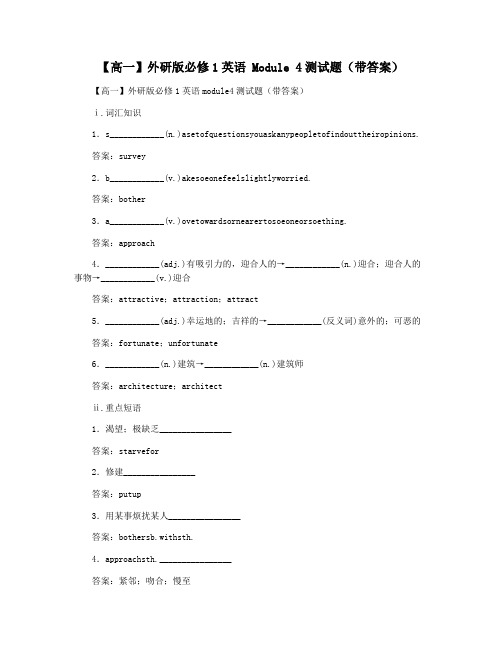
【高一】外研版必修1英语 Module 4测试题(带答案)【高一】外研版必修1英语module4测试题(带答案)ⅰ.词汇知识1.s____________(n.)asetofquestionsyouaskanypeopletofindouttheiropinions.答案:survey2.b____________(v.)akesoeonefeelslightlyworried.答案:bother3.a____________(v.)ovetowardsornearertosoeoneorsoething.答案:approach4.____________(adj.)有吸引力的,迎合人的→____________(n.)迎合;迎合人的事物→____________(v.)迎合答案:attractive;attraction;attract5.____________(adj.)幸运地的;吉祥的→____________(反义词)意外的;可恶的答案:fortunate;unfortunate6.____________(n.)建筑→____________(n.)建筑师答案:architecture;architectⅱ.重点短语1.渴望;极缺乏________________答案:starvefor2.修建________________答案:putup3.用某事烦扰某人________________答案:bothersb.withsth.4.approachsth.________________答案:紧邻;吻合;慢至5.starvetodeath________________答案:冻死6.putoff________________答案:延后ⅲ.必背句型1.自从上次我们见面以已经六年了。
________________sixyears________welastsaweachother.答案:it’sbeen;since2.这是我第一次参观你的家乡。
外研版高中英语必修一综合测评(四)(Module4)
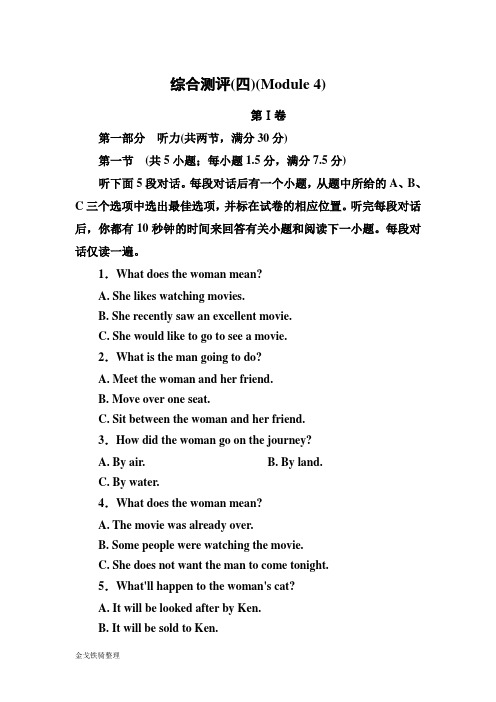
综合测评(四)(Module 4)第Ⅰ卷第一部分听力(共两节,满分30分)第一节(共5小题;每小题1.5分,满分7.5分)听下面5段对话。
每段对话后有一个小题,从题中所给的A、B、C三个选项中选出最佳选项,并标在试卷的相应位置。
听完每段对话后,你都有10秒钟的时间来回答有关小题和阅读下一小题。
每段对话仅读一遍。
1.What does the woman mean?A. She likes watching movies.B. She recently saw an excellent movie.C. She would like to go to see a movie.2.What is the man going to do?A. Meet the woman and her friend.B. Move over one seat.C. Sit between the woman and her friend.3.How did the woman go on the journey?A. By air.B. By land.C. By water.4.What does the woman mean?A. The movie was already over.B. Some people were watching the movie.C. She does not want the man to come tonight.5.What'll happen to the woman's cat?A. It will be looked after by Ken.B. It will be sold to Ken.C. It has been killed by Ken.第二节(共15小题;每小题1.5分,满分22.5分)听下面5段对话或独白。
每段对话或独白后有几个小题,从题中所给的A、B、C三个选项中选出最佳选项,并标在试卷的相应位置。
- 1、下载文档前请自行甄别文档内容的完整性,平台不提供额外的编辑、内容补充、找答案等附加服务。
- 2、"仅部分预览"的文档,不可在线预览部分如存在完整性等问题,可反馈申请退款(可完整预览的文档不适用该条件!)。
- 3、如文档侵犯您的权益,请联系客服反馈,我们会尽快为您处理(人工客服工作时间:9:00-18:30)。
必修1模块4单元测试题第一部分:(共两节, 满分30分)◆第一节(共5小题;每小题1.5分,满分7.5分)听下面5段对话。
每段对话后有一个小题,从题中所给的A、B、C三个选项中选出最佳选项,并标在试卷的相应位置。
听完每段对话后,你都有10秒钟的时间来回答有关小题和阅读下一小题。
每段对话仅读一遍。
1. Where are the speakers?A. At school.B. At a fishing place.C. At a restaurant.2. Why does the woman look tired?A. She is very sick.B. She didn’t get enough sleep.C. She was looking after a baby.3. What does the woman need?A. A housemate.B. A house buyer.C. A room cleaner.4. What did the man plan to do the next day?A. To buy cartoons for his kids.B. To go to the park.C. To watch cartoons.5. Where was the woman at noon?A. In the dining room.B. In the library.C. In the classroom.◆第二节(共15小题;每小题1.5分,满分22.5分)听下面5段对话或独白。
每段对话或独白后有几个小题,从题中所给的A、B、C 三个选项中选出最佳选项,并标在试卷的相应位置。
听每段对话或独白前,你将有时间阅读各个小题,每小题5秒钟;听完后,各小题将给出5秒钟的作答时间。
每段对话或独白读两遍。
听下面一段对话,回答第6和第7两个小题。
6. Where did the car accident happen?A. At the airport.B. On the highway.C. Near the hospital.7. What caused the car accident?A. The bad weather.B. The driver’s sleepiness.C. Speeding.听下面一段对话,回答第8和第9两个小题。
8. What class notes does the woman want to borrow?A. History.B. Biology.C. English.9. When will the woman get the class notes?A. Next Friday.B. Next Thursday.C. Next Monday.听下面一段对话,回答第10至第12三个小题。
10. Where does the woman’s mother work?A. In Spain.B. In Germany.C. In France.11. Who bought the ticket for the woman?A. Her mother.B. Her grandfather.C. Her uncle.12. Who will the man help the woman look after?A. Her grandfather.B. Kitty.C. Max.听下面一段对话,回答第13至第16四个小题。
13. What does the woman think of being a model?A. Attractive.B. Challenging.C. Tiring.14. What is the hardest thing for the woman?A. Putting on makeup.B. Getting up early.C. Getting the dresses ready.15. What is the most important thing?A. Standing in poses.B. Standing still.C. Changing clothes quickly.16. What is the possible relationship between the speakers?A. Interviewer and interviewee.B. Husband and wife.C. Boss and secretary.听下面一段独白,回答第17至第20四个小题。
17. What type is the film 2012?A. A science fiction film.B. A horror film.C. An action film.18. What films does the speaker like best?A. Science fiction films.B. Comedy films.C. Horror films.19. What will the speaker do next?A. Go to a cinema.B. Watch a movie.C. Discuss movies.20. Where is the film The Ring made?A. In America.B. In Japan.C. In Korea.第二部分:英语知识运用(共两节, 满分35分)◆第一节单项填空(共15小题;每小题1分,满分15分)从A、B、C、D四个选项中选出可以填入空白处的最佳选项。
21. A recent _______shows that most people are worried about the increasing house prices.A. informationB. impressionC. surveyD. ceremony22. Qingdao is _________ famous harbour city and we go there for ______ visit every year.A. the; aB. a; aC. a; theD. the; the23. ______ your books and make sure the room is clean and tidy.A. Put awayB. Put offC. Put backD. Put up24. The teacher was so _______ that I didn’t dare speak a word in f ront of him.A. seriousB. shyC. formalD. respectable25. I’d like to buy a house in the countryside to _______ the noise of the city.A. get along withB. get away fromC. get hold ofD. get used to26. I _______ to Beijing three times so far.A. am goingB. goC. had beenD. have been27. Mum! I ______ all my homework. Can I go out with Li Ming now?A. am finishingB. finishC. finishedD. have finished28. She was very ___________ to have survived the earthquake.A. fortunateB. attractiveC. embarrassedD. nervous29. We can’t find John anywhere. Lucy ______ him by phone now.A. contactsB. had contactedC. was contactingD. is contacting30. ______ I haven’t had any success. However, I’ll keep trying.A. So longB. By farC. So farD. By then31. —Why does the fish smell so awful?—It _______.A. goes badB. has gone badC. had gone badD. went bad32. Don’t bother your father now; he’s ______ about his work at the moment.A. worriedB. being worriedC. worryD. to worry33. Which _______ of the city do you live?A. siteB. suburbC. downtownD. district34. David was badly injured in the car accident. He _______ in the hospital now.A. wasB. will beC. would beD. is35. —I’ve passed the college entrance examination!—___________ !A. CelebrationsB. CongratulationsC. ReallyD. Definitely◆第二节完形填空(共20小题;每小题1分,满分20分)阅读下面短文,掌握其大意,然后从36-55各题所给的四个选项(A、B、C和D)中,选出最佳选项。
On a terrible rainy winter day, I was returning to the office after 36 when I saw a man walking towards me with two huge boxes of papers. Suddenly he 37 them all! It was an awful mess with hundreds of 38 all over the path (小路) 39 me! The man started trying to 40 all the papers. Many people walked past him 41 even a look at him.42 it was the end of my lunch break and I would be43 for work if I stopped to help him, I didn’t mind at all. I knew if I44 what had happened to my boss he wouldn’t be 45 about it. So I stopped to help the man collect the papers and asked if he would like me to carry a box to 46 he was going for him. He nodded and 47 at me. So I carried one of the boxes. It was too 48 for a girl like me, but I didn’t fall behind. I just 49 him with a big smile on my face. When we got there, he 50 me a lot for helping him out. 51 , I wasn’t that late when I 52 my office!One can’t 53 in the world without the help from others. Sometimes your 54 can really make a difference to people in 55 . The more we help others, the better the world will be.36. A. breakfast B. lunch C. supper D. dinner37. A. threw B. lost C. read D. dropped38. A. papers B. boxes C. pens D. books39. A. at the foot of B. on right of C. at back of D. in front of40. A. set up B. pick up C. give out D. take back41. A. without B. along C. besides D. except42. A. When B. If C. Though D. But43. A. ready B. alone C. late D. sad44. A. wrote B. explained C. telephoned D. complained45. A. cheerful B. proud C. pleased D. angry46. A. where B. what C. whom D. which47. A. shouted B. looked C. smiled D. laughed48. A. light B. heavy C. important D. useful49. A. followed B. saved C. shared D. cared50. A. thanked B. loved C. moved D. praised51. A. Completely B. Suddenly C. Certainly D. Fortunately52. A. left B. found C. reached D. passed53. A. succeed B. afford C. approach D. decide54. A. work B. help C. courage D. idea55. A. sight B. danger C. need D. distance第三部分:阅读理解(共20小题; 每小题2分, 满分40分)阅读下列短文,从每题所给的四个选项(A、B、C和D)中选出最佳选项。
